The truth-is-stranger-than-fiction tale of Eastern-European Jews finding refuge from the Nazis in 1941 Japan merits more nuanced treatment than it gets in West Coast Jewish Theatre’s credibility-defying World Premiere historical melodrama Fugu.
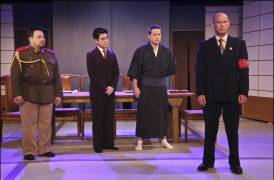 Steven G. Simon and Howard Teichman’s overlong script has Colonel No(ri)hiro Yasue (Ryan Moriarty) vowing to protect the six-thousand Lithuanian Jews then residing in Kobe by sending Dr. Avram Kaufman (Warren Davis) on a pro-Japan PR mission to Wall Street, the White House, and Hollywood, a plan based on the mistaken belief that the refugees were part of an international cabal supposedly extending from NYC to DC to La La Land.
Steven G. Simon and Howard Teichman’s overlong script has Colonel No(ri)hiro Yasue (Ryan Moriarty) vowing to protect the six-thousand Lithuanian Jews then residing in Kobe by sending Dr. Avram Kaufman (Warren Davis) on a pro-Japan PR mission to Wall Street, the White House, and Hollywood, a plan based on the mistaken belief that the refugees were part of an international cabal supposedly extending from NYC to DC to La La Land.
Meanwhile, Avram’s frisky daughter Sarah (Rosie Moss) has fallen head over heels for the colonel’s handsome young assistant Setsuzo Kotsuji (Scott Keiji Takeda), a love forbidden not just by the racial-purity-loving Japanese but also by Jewish law as embodied by intransigent Rabbi Shlomo Shapira (Peter Altschuler).
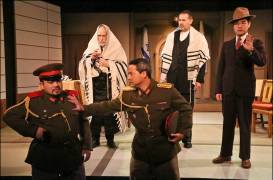 Not only does Colonel Yasue have to contend with “Butcher Of Warsaw” Colonel Josef Meisinger’s (David Preston) insistence that the Kobe Jews be exterminated in the most horrific of ways, death by sharks being arguably the least horrendous of the three extermination techniques he proposes, the Japanese colonel must also deal with an uncooperative second-in-command, Captain Yosuke Matsuoka (Marcel Licera), who’d like nothing better to do than Meisinger’s bidding.
Not only does Colonel Yasue have to contend with “Butcher Of Warsaw” Colonel Josef Meisinger’s (David Preston) insistence that the Kobe Jews be exterminated in the most horrific of ways, death by sharks being arguably the least horrendous of the three extermination techniques he proposes, the Japanese colonel must also deal with an uncooperative second-in-command, Captain Yosuke Matsuoka (Marcel Licera), who’d like nothing better to do than Meisinger’s bidding.
Unfortunately for these real-life heroes and villains, Simon’s and director Teichman’s stilted script is filled with expository dialog spoken with a variety of foreign accents whether characters are conversing in their native tongue or in something-as-a-second-language.
As to what that something is, your guess is as good as mine since it’s unlikely that scenes involving various combinations of Japanese, Lithuanians, and Germans lacking a common tongue could possibly have taken place without the aid of interpreters.
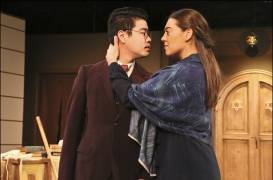 As for Setuji’s romance with Sarah, the twosome may indeed have fallen in love, but not only was the real-life Japanese diplomat already in his early forties in 1941 and not the 20something of Simon and Teichman’s script, it’s highly unlikely that their doomed love affair would have unfolded in virtually the same timeframe as Romeo and Juliet’s.
As for Setuji’s romance with Sarah, the twosome may indeed have fallen in love, but not only was the real-life Japanese diplomat already in his early forties in 1941 and not the 20something of Simon and Teichman’s script, it’s highly unlikely that their doomed love affair would have unfolded in virtually the same timeframe as Romeo and Juliet’s.
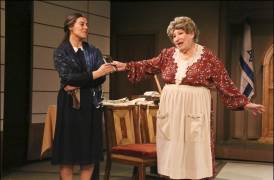 And don’t get me started on Mrs. Dovitch (Bryna Weiss), the elderly widow who shows up in Act Two with Borscht Belt-ready shtick, her Alzheimer’s-like symptoms coming and going at the playwrights’ whim, or young firebrand Max Kaminsky (Matt Gottlieb), who voices protests at a town-hall meeting during which, miraculously, speakers of three different languages all appear to understand every word the others are saying.
And don’t get me started on Mrs. Dovitch (Bryna Weiss), the elderly widow who shows up in Act Two with Borscht Belt-ready shtick, her Alzheimer’s-like symptoms coming and going at the playwrights’ whim, or young firebrand Max Kaminsky (Matt Gottlieb), who voices protests at a town-hall meeting during which, miraculously, speakers of three different languages all appear to understand every word the others are saying.
Not that plenty of Hollywood fare doesn’t rewrite history or fictionalize real characters for dramatic effect, and Fugu’s futzing with the facts could be excused were it as well written as Argo or The Imitation Game, but those two scripts won Oscars.
Still, for linguistic reasons alone, Fugu seems better suited to non-fiction or novel form than to stage or screen.
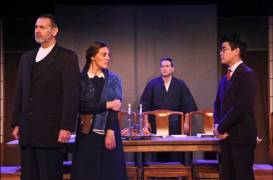 All of this leaves a cast hobbled with ESL accents to do their best with the material they have been given, and to their credit, their work is nothing if not committed.
All of this leaves a cast hobbled with ESL accents to do their best with the material they have been given, and to their credit, their work is nothing if not committed.
Gottleib and understudy Akiko Katagiri open the production with an exquisite juxtaposition of Chasidic and Japanese dance, the former choreographed by Hai Cohen, the latter by Kaz Matamura.
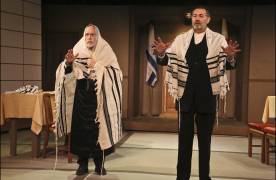 Kurtis Bedford’s set, Ellen Monocroussos’s lighting, Shon LeBlanc’s costumes, and Bill Froggatt’s sound design are all first-rate, though the blood-red lighting that accompanies Meisinger’s threats seems a case of overkill, no pun intended.
Kurtis Bedford’s set, Ellen Monocroussos’s lighting, Shon LeBlanc’s costumes, and Bill Froggatt’s sound design are all first-rate, though the blood-red lighting that accompanies Meisinger’s threats seems a case of overkill, no pun intended.
Froggatt merits kudos for the PowerPoint presentation that opens and closes the production with historical black-and-whites of the people and events around which Fugu revolves. Jessica Bennett scores points too for her fight choreography.
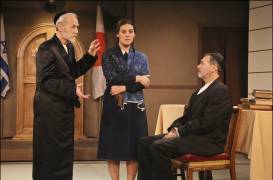 Fugu is produced by Teichman and Froggatt. Priscilla Miranda is stage manager. Casting is by Raul Clayton Staggs. Mark Labella and Caroline Westheimer are understudies.
Fugu is produced by Teichman and Froggatt. Priscilla Miranda is stage manager. Casting is by Raul Clayton Staggs. Mark Labella and Caroline Westheimer are understudies.
A powerful epilogue reminds us that the men and women we’ve been seeing did indeed live and die. If only Fugu gave them their due.
West Coast Jewish Theatre, Pico Playhouse, 10508 W. Pico Blvd., Los Angeles.
www.wcjt.org
–Steven Stanley
March 5, 2017
Photos: Michael Lamont
Tags: Los Angeles Theater Review, Pico Playhouse, West Coast Jewish Theatre



 Since 2007, Steven Stanley's StageSceneLA.com has spotlighted the best in Southern California theater via reviews, interviews, and its annual StageSceneLA Scenies.
Since 2007, Steven Stanley's StageSceneLA.com has spotlighted the best in Southern California theater via reviews, interviews, and its annual StageSceneLA Scenies.







 COPYRIGHT 2025 STEVEN STANLEY :: DESIGN BY
COPYRIGHT 2025 STEVEN STANLEY :: DESIGN BY